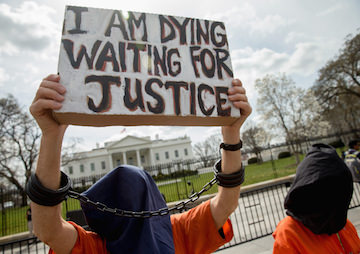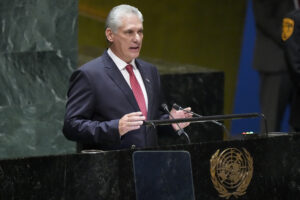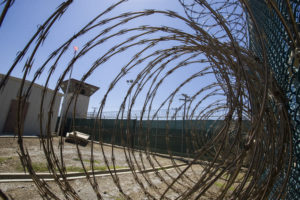Military and Intelligence Officials Deem Many Guantanamo Prisoners Fit for Release
Contrary to widespread concern, a U.S. security panel has decided that many of the detainees at Gitmo are not "too dangerous" to be freed.

At a demonstration outside the White House on March 11, a man dressed as a detainee calls attention to the plight of those held for years at the Guantanamo Bay prison. (Andrew Harnik / AP)
Those who oppose closing the U.S. detention center at Guantanamo Bay often suggest that the prisoners held there are too dangerous to be released, either because of who they were before they were placed there or who they became during their detention.
Well, a review board that includes military and intelligence officials has been looking at a list of 50 prisoners who were previously deemed “too dangerous to transfer but not feasible for prosecution,” and finding many of them fit for release.
AP reports:
The first 23 decisions announced by the Periodic Review Board as of this month have skewed heavily in favor of the prisoners. It has unanimously cleared 19 for release, and said five will continue to be held but will be re-evaluated again later. Some of the approved have already left Guantanamo while the rest are expected to depart over the summer.
Lawyers for detainees welcomed the initial results, although they say the men shouldn’t have been held without charge for so long in the first place.
“These people have not been reviewed in over six years. They have changed, circumstances have changed, and they have needed a fresh look,” said Pardiss Kebriaei, a lawyer for the New York-based Center for Constitutional Rights who represented a prisoner cleared by the Periodic Review Board.
The deliberations of the board are private. But David Glazier, a professor at Loyola Law School who has analyzed records of the proceedings released by the Pentagon, said the members appear to be treating past assessments of prisoners “with a healthier degree of skepticism” than officials did in the past.
“If you just care about justice for human beings it’s a little odd that it’s taken 14 years to ask the questions in a hard enough way to discover that,” said Glazier, a former Navy officer and expert in military law.
.
—Posted by Alexander Reed Kelly.
Independent journalism is under threat and overshadowed by heavily funded mainstream media.
You can help level the playing field. Become a member.
Your tax-deductible contribution keeps us digging beneath the headlines to give you thought-provoking, investigative reporting and analysis that unearths what's really happening- without compromise.
Give today to support our courageous, independent journalists.






You need to be a supporter to comment.
There are currently no responses to this article.
Be the first to respond.